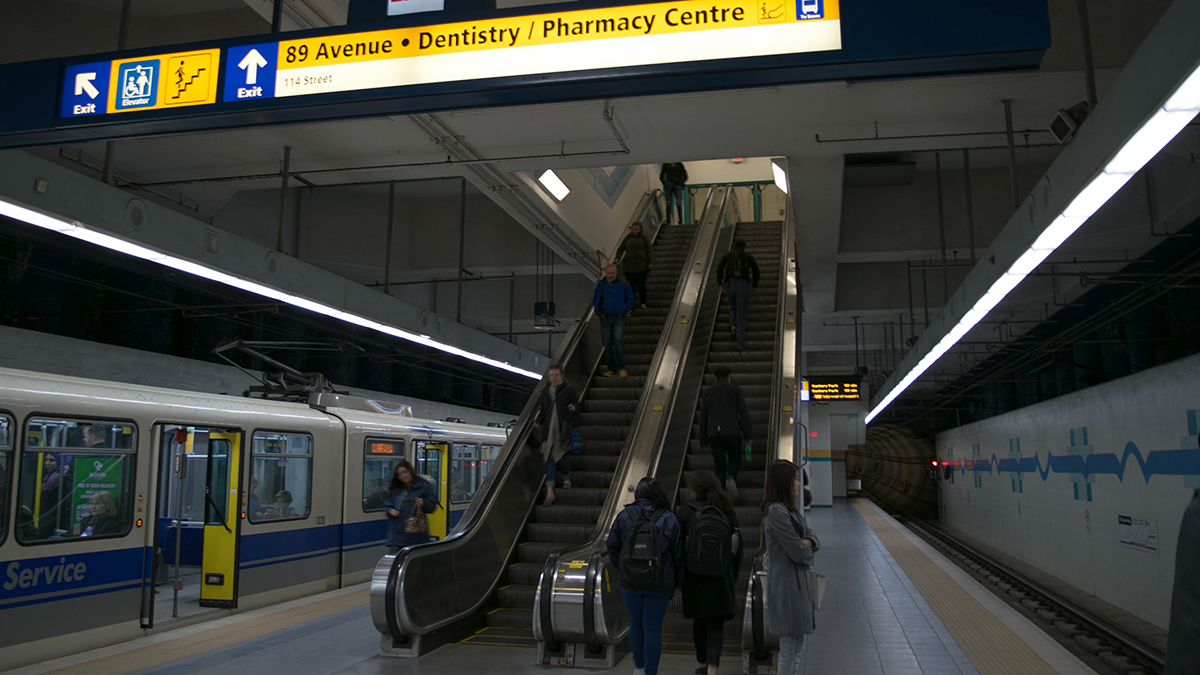“Escalator Guy;” the story behind the U of A escalator website
Jordan Schulz thought of the idea during one of his lectures and by the time his class finished the site was live.
 Alex Cook
Alex CookWhile the University of Alberta is known for its unpredictable escalators around campus LRT stations, the U of A escalator website was created in order to keep this unpredictability, predictable.
Jordan Schulz, who graduated from the University of Alberta with an engineering degree, left a nostalgic “mark” on the university by providing the well-known U of A Escalator website. Created in 2013, the website has given not only the creator nostalgia and joy, but also new and old students that end up stumbling across it.
The seeds for the escalator site began in Schulz’s eight-month summer co-op term for the City of Edmonton’s LRT back in 2012. At the time, Schulz worked on the LED messages that scrolled across the bottom of the LRT screens. In order to post the LED signs, Schulz needed to collect the LRT information.
“I built the entire system that contacts the building management system that monitors the escalators and essentially grabbed all information to put on the LED signs,” Schulz said. “So, I guess I had a very close relationship with the LRT.”
Taking that knowledge from his co-op, the website is connected to an open data website that keeps track of escalator outages throughout Edmonton. Essentially, the U of A escalator website updates every 10 minutes or so by connecting directly to publicly accessible information. Schulz’s escalator website takes the escalator information and states if the U of A escalators specifically are working.
“It counts all the [U of A escalators] that are active and if they’re all active, then it says ‘YUP’ and if [they aren’t], it says ‘NOPE,’” Schulz explained.
The site then lists which LRT escalators are not working at the time.

Months after finishing the co-op term, his idea for the site came to fruition. Back in the winter term of 2013, Schulz described how he was inspired to use the “YUP” and “NOPE” format while sitting in an ETLC lecture hall.
“I think I was probably just browsing Reddit at 8 a.m. on a day just like today,” Schulz said. “[I was] in ETLC, in a lecture hall, and there were probably some sites… like, ‘Is It Christmas?’ And it says, ‘Yup’ or ‘Nope’.”
The university escalators are known to break down, often at the most inconvenient time for students. So, as Schulz browsed through his phone, he noticed a post complaining about the university escalators and thought about the management system he had access to from his co-op term with the City of Edmonton’s LRT.
“So, there I was sitting at an 8 a.m. lecture, bored out of my mind —and on my phone — [and I thought] ‘you know what? I have this information, we could just put it on a website,’ and I literally just bought the domain on my phone in class,” Schulz said.
At the end of his class, the site was live.
“It’s just a fun kind of a spur-of-the-moment type thing. That, like, ‘Hey, why not?’” Schulz said.
At the end of the day, Schulz explains that he created the site just “for the fun of it.” He sees this spirit carried on by the U of A students who end up having a laugh or feeling nostalgic after finding the site.
“When people stumble across it, it’s kind of like a little Easter egg at the U of A,” Schulz said.
The U of A escalator website may also be used for individuals with accessibility issues. Schulz decided to expand the project and created a follow-up project website that contains all of Edmonton’s LRT escalators and elevators’ statuses. This project was meant to help assist those with accessibility issues by keeping them up-to-date about what LRT stations had working elevators or escalators.
In addition to this website is an accompanying Twitter account @yeglrt that detects whether an elevator is working or not. This Twitter account detects ETS and City of Edmonton tweets about the LRT, Capital, or Metro and retweets it so followers may be easily notified.
While the U of A escalator website is not as visited as much as it used to be due to COVID-19 and students being away, Schulz states that sometimes students may stumble across the site and feel nostalgic. A couple of months ago, a post on the Facebook public group, Overheard at the University of Alberta, received around 400 likes about Schulz’s website. For Schulz, seeing his site pop back up on social media brings him a sense of joy.
“I don’t know how these random people on Reddit come across it, but when they do, I’ll see it and it gives me a little chuckle,” Schulz said. “It brings me a smile like every few months.”
At times, Schulz will run into someone who knows the website and he mentions how he was the creator of the site.
“Yup — I’m the U of A escalator guy! That’s my mark on the U of A. Whoever would’ve thought?”




